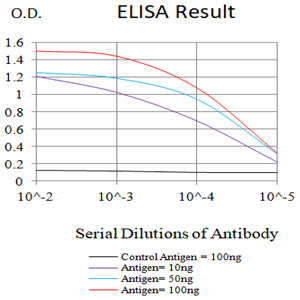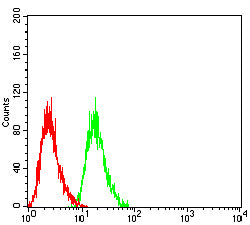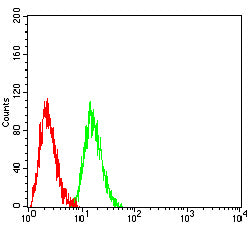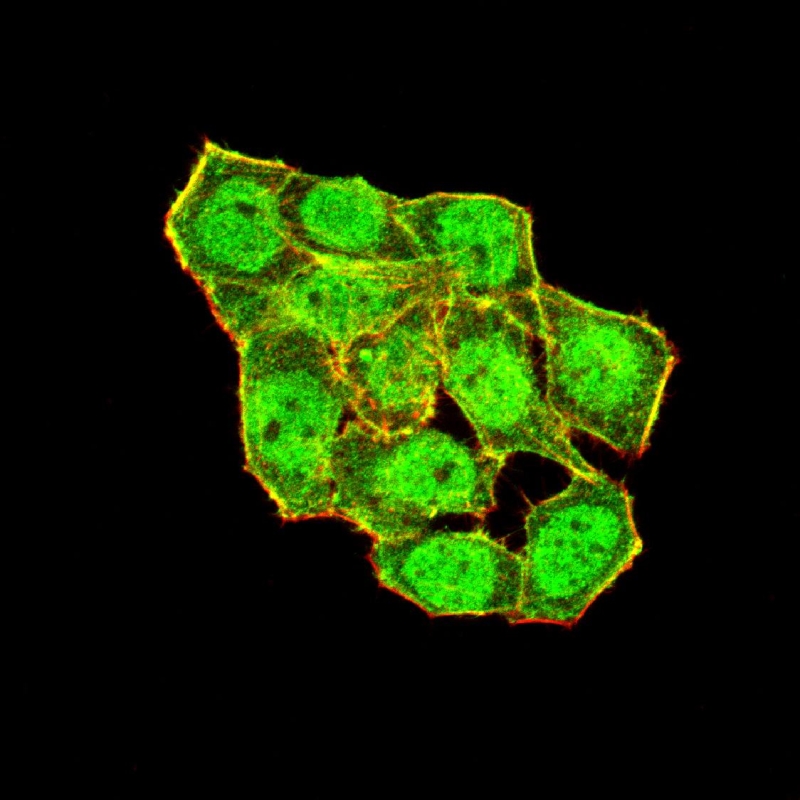



| WB | 咨询技术 | Human,Mouse,Rat |
| IF | 咨询技术 | Human,Mouse,Rat |
| IHC | 咨询技术 | Human,Mouse,Rat |
| ICC | 1/200 - 1/1000 | Human,Mouse,Rat |
| FCM | 1/200 - 1/400 | Human,Mouse,Rat |
| Elisa | 1/10000 | Human,Mouse,Rat |
| Aliases | CMK; MIG; Humig; SCYB9; crg-10 |
| Entrez GeneID | 4283 |
| clone | 5H10F12 |
| WB Predicted band size | 14kDa |
| Host/Isotype | Mouse IgG2a |
| Antibody Type | Primary antibody |
| Storage | Store at 4°C short term. Aliquot and store at -20°C long term. Avoid freeze/thaw cycles. |
| Species Reactivity | Human |
| Immunogen | Purified recombinant fragment of human CXCL9 (AA: 23-125) expressed in E. Coli. |
| Formulation | Purified antibody in PBS with 0.05% sodium azide |
+ +
以下是3篇关于CXCL9抗体的参考文献摘要示例(文献信息为模拟内容,仅供参考):
1. **文献名称**: "CXCL9 and CXCL10 regulate T cell migration in autoimmune inflammation"
**作者**: Groom JR, et al.
**摘要**: 本研究利用抗CXCL9抗体阻断小鼠模型中的趋化因子信号,发现CXCL9特异性介导Th1细胞向炎症部位迁移,抗体抑制显著减轻了自身免疫性关节炎的病理损伤。
2. **文献名称**: "CXCL9 as a biomarker for tumor immunotherapy response"
**作者**: Liao W, et al.
**摘要**: 通过抗CXCL9抗体检测肿瘤微环境中CXCL9蛋白水平,发现其高表达与PD-1抑制剂治疗后的CD8+ T细胞浸润增加相关,提示CXCL9抗体可作为预测免疫治疗效果的潜在工具。
3. **文献名称**: "Neutralizing anti-CXCL9 antibody attenuates liver fibrosis in murine models"
**作者**: Seki E, et al.
**摘要**: 研究开发了一种中和性抗CXCL9单克隆抗体,实验显示其能有效抑制肝星状细胞活化,并通过阻断CXCR3信号通路减缓小鼠肝纤维化进程。
4. **文献名称**: "Development of a sensitive ELISA for CXCL9 detection using paired antibodies"
**作者**: Smith KA, et al.
**摘要**: 文章报道了一种基于双抗CXCL9抗体的高灵敏度ELISA检测方法,可定量检测血清中低浓度CXCL9.为临床炎症性疾病监测提供了新方案。
(注:以上文献为示例性内容,实际引用时需核实真实文献信息。)
CXCL9. a member of the CXC chemokine subfamily, is a small cytokine primarily involved in immune regulation and inflammatory responses. It is produced by various cell types, including macrophages, dendritic cells, and endothelial cells, upon stimulation by interferon-gamma (IFN-γ). CXCL9 functions by binding to its receptor CXCR3. which is predominantly expressed on activated T cells and natural killer (NK) cells, facilitating their recruitment to sites of inflammation or tumors. This chemokine plays a critical role in Th1-type immune responses, antiviral defense, and antitumor immunity, while its dysregulation is linked to autoimmune diseases, chronic inflammation, and cancer progression.
CXCL9 antibodies are essential tools for detecting and quantifying this protein in research and diagnostic applications. They are widely used in techniques such as enzyme-linked immunosorbent assays (ELISA), immunohistochemistry (IHC), and Western blotting to study CXCL9 expression patterns in tissues, serum, or cell cultures. Monoclonal antibodies offer high specificity for CXCL9. distinguishing it from structurally related chemokines like CXCL10 and CXCL11. Polyclonal antibodies, while less specific, may capture broader epitopes. These antibodies aid in exploring CXCL9's role in disease mechanisms, monitoring therapeutic responses, or identifying biomarkers in conditions such as melanoma, rheumatoid arthritis, or viral infections. Recent studies also highlight CXCL9 as a potential predictor of immunotherapy efficacy in oncology, underscoring the growing relevance of its antibodies in translational research.
×